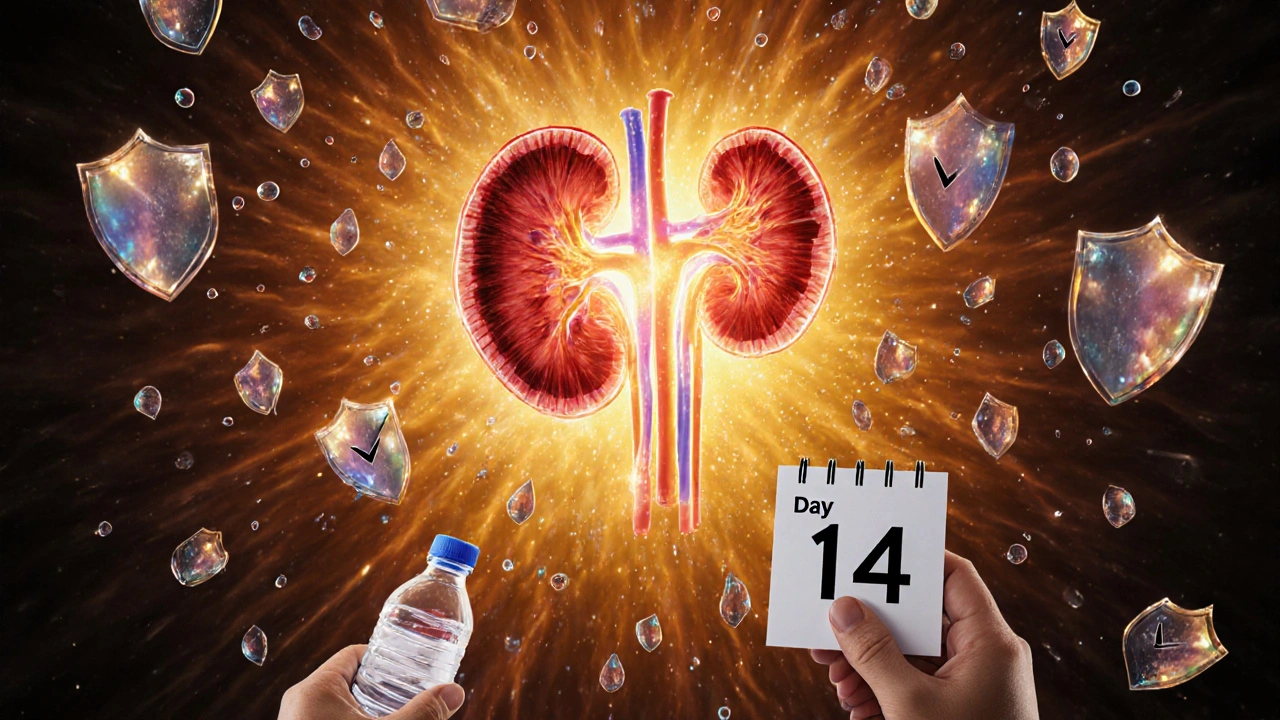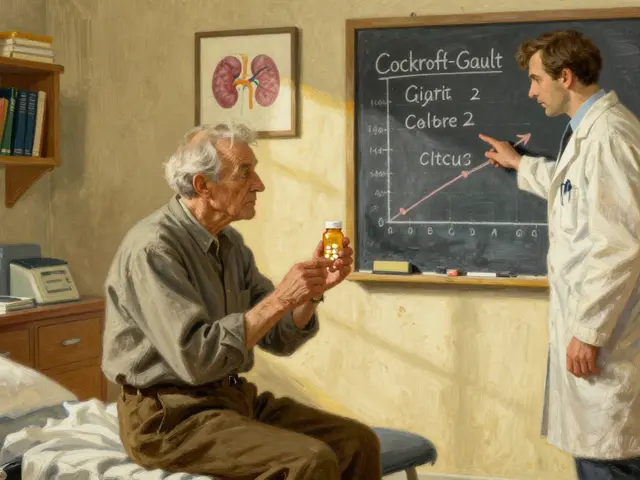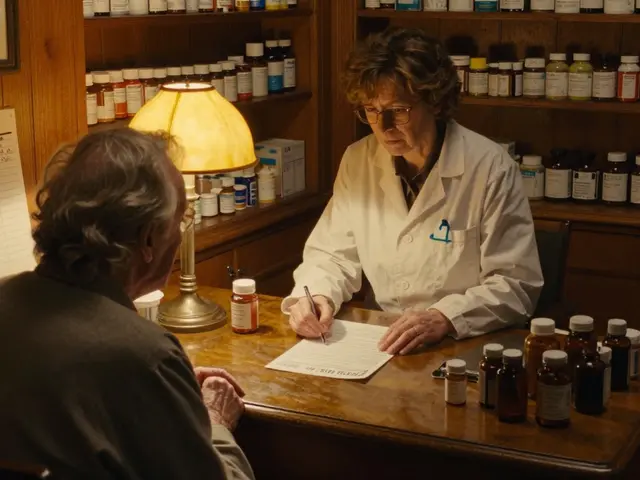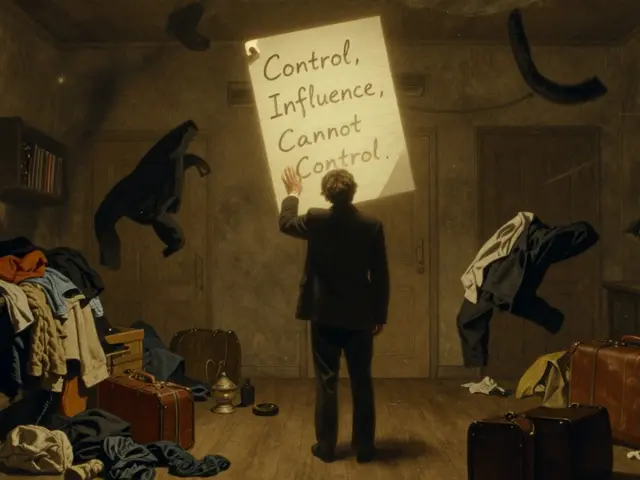SGLT2 Inhibitor Side Effect Risk Calculator
Personal Risk Assessment
This calculator estimates your risk of dehydration and dizziness when starting SGLT2 inhibitors based on your medical profile and habits. Enter your information to see your personalized risk score and recommendations.
Your Personalized Risk Assessment
Your Risk Score:
0Estimated BP Reduction:
Personalized Recommendations
What Are SGLT2 Inhibitors, and Why Do They Cause Dehydration?
SGLT2 inhibitors - also called gliflozins - are diabetes drugs that make your kidneys flush out extra sugar through urine. That sounds helpful, right? It is. But here’s the catch: when glucose leaves your body, it drags water and sodium along with it. This isn’t just a side effect - it’s how the drug works. And that’s why dehydration is one of the most common issues people face when starting these medications.
Think of it like this: your kidneys normally hold onto most of the sugar your blood filters. SGLT2 blockers stop that. So instead of reabsorbing about 90% of filtered glucose, your body lets 70-100 grams of sugar escape daily. That’s like losing 2-3 candy bars’ worth of sugar every day. But sugar doesn’t leave alone. For every gram of glucose excreted, about 3-4 mL of water follows. That adds up to 1-1.5 liters of extra fluid lost in the first week. That’s roughly the volume of a large water bottle - gone in days.
This isn’t just theoretical. Clinical trials show that between 1.3% and 2.8% of people taking SGLT2 inhibitors experience volume depletion - the medical term for low fluid levels. That’s more than double the risk compared to placebo. Older adults, especially those over 65, are at higher risk. Why? Because their bodies don’t signal thirst as strongly, and many are already on other water-loss medications like diuretics or blood pressure pills.
Why You Might Feel Dizzy After Starting SGLT2 Inhibitors
Dizziness isn’t random. It’s your body’s way of saying your blood pressure just dropped - fast. About 3.5% to 5.8% of people on SGLT2 inhibitors report dizziness, compared to just 2.5%-3.2% on placebo. Most of those cases happen in the first four weeks. That’s not a coincidence. That’s when your body is losing the most fluid.
When you lose water and salt, your blood volume goes down. Less blood means less pressure pushing through your arteries. When you stand up, your brain doesn’t get enough blood right away - and you feel lightheaded or faint. This is called orthostatic hypotension. Studies show that over 60% of people who get dizzy on these drugs have a drop in systolic blood pressure of 20 mmHg or more when they stand.
Some people handle it fine. Others can’t stand up without grabbing the wall. Risk factors? Age over 75, already low blood pressure (under 130 mmHg systolic), or taking other drugs that lower blood pressure - like ACE inhibitors, ARBs, or loop diuretics. If you’re on three or more blood pressure meds and start an SGLT2 inhibitor, your dizziness risk jumps nearly threefold.
Real-world stories back this up. On Reddit, users say things like: “Started Jardiance last week - got dizzy standing up. Doctor said it’s normal for the first month.” That’s typical. For many, it fades as the body adjusts. But for others, it doesn’t. And that’s when you need to talk to your doctor.
How SGLT2 Inhibitors Lower Blood Pressure - and Why That’s a Good Thing
Here’s the twist: the same mechanism that causes dizziness also helps your heart. SGLT2 inhibitors lower blood pressure - not just a little, but consistently. On average, systolic pressure drops 4-6 mmHg, and diastolic drops 1-2 mmHg within the first two weeks. That’s similar to what you’d see with a low-dose thiazide diuretic. But here’s the kicker: it works even if you don’t have diabetes.
In the EMPA-REG OUTCOME trial, people with heart disease and type 2 diabetes saw their systolic pressure fall by 5 mmHg on empagliflozin. In the DAPA-HF trial, which included patients without diabetes, dapagliflozin lowered systolic pressure by 4.5 mmHg. That’s not just a number. That’s enough to reduce stroke risk, heart attacks, and heart failure hospitalizations.
How does it work? Two ways. First, by flushing out fluid - less volume in your blood vessels means lower pressure. Second, by relaxing your arteries. SGLT2 inhibitors improve how your blood vessels respond to stress, reducing stiffness. That’s why some studies show an 8-12% drop in arterial stiffness over 24 weeks - something most blood pressure pills don’t do.
This is why major guidelines now recommend SGLT2 inhibitors for heart failure, even if you’re not diabetic. The American Heart Association and European Society of Cardiology both list them as first-line treatment for heart failure with reduced ejection fraction. The benefit? A 17% drop in cardiovascular death. That’s 6 lives saved per 100 patients over 18 months. The dizziness? Usually temporary. The protection? Lifelong.
Who’s Most at Risk for Side Effects - and What to Watch For
Not everyone reacts the same. Certain people are more likely to feel the effects of fluid loss. Here’s who needs extra care:
- People over 65: Thirst signals weaken with age. You might not feel thirsty even when you’re dehydrated.
- Those with kidney issues: If your eGFR is below 60, your kidneys can’t handle the extra workload. Volume depletion risk doubles.
- People on other diuretics: Taking furosemide (Lasix) or hydrochlorothiazide with an SGLT2 inhibitor? That’s a double diuretic effect. High risk.
- Those with low blood pressure: If your systolic is under 120 mmHg, you’re more likely to crash into symptomatic hypotension.
- People in hot weather or exercising: Sweat + drug = faster fluid loss. You need to drink more.
Watch for these signs: dark yellow urine, dry mouth, unusual fatigue, feeling faint when standing, or a sudden drop in weight (more than 2 kg in a week). These aren’t normal. They’re red flags.
How Doctors Manage These Side Effects - And What You Can Do
Good doctors don’t just prescribe and walk away. They plan ahead. Here’s what they do:
- Start low: Instead of 25 mg of empagliflozin, they might start with 10 mg - especially in older adults or those with kidney issues.
- Check blood pressure before and after: Orthostatic BP (lying down vs. standing) is checked at the first follow-up, usually within 7-10 days.
- Adjust other meds: If you’re on a diuretic, they may reduce the dose by 25-50% to avoid over-diuresis.
- Advise extra fluids: Most recommend drinking an extra 500-1000 mL of water daily, especially in heat or during exercise.
- Pause during illness: If you get sick with vomiting or diarrhea, stop the drug until you’re back on your feet. Fluid loss can turn dangerous fast.
As a patient, here’s your action plan:
- Drink water consistently - don’t wait until you’re thirsty.
- Check your weight weekly. A drop of more than 2 kg in a week? Call your doctor.
- Stand up slowly. If you feel dizzy, sit or hold onto something.
- Don’t skip your follow-up. That 7-10 day visit matters more than you think.
- Know your numbers. If your systolic blood pressure drops below 90 mmHg, contact your provider immediately.

Is It Worth It? The Big Picture
Yes. But only if you’re managed right.
SGLT2 inhibitors aren’t just sugar-lowering pills anymore. They’re heart and kidney protectors. In people with heart failure, they cut hospitalizations by 30%. In those with chronic kidney disease, they slow kidney decline by up to 50%. For someone with diabetes and high blood pressure, this drug can mean the difference between needing dialysis in 5 years - or staying off it for decades.
The trade-off? A few weeks of dizziness or mild dehydration. For most, it fades. For a small group, it doesn’t. That’s why screening and communication matter.
One patient on Drugs.com wrote: “I got dizzy for two weeks. I thought I’d quit. But I stuck with it. Now I feel better than I have in years.” That’s the story behind the data.
Final Takeaway: Don’t Fear the Side Effects - Manage Them
SGLT2 inhibitors cause dehydration, dizziness, and lower blood pressure - not because they’re flawed, but because they’re powerful. Their side effects are predictable, measurable, and manageable. They’re not reasons to avoid the drug. They’re reasons to use it wisely.
If you’re considering this medication, ask your doctor: “What’s my risk for fluid loss?” “Should I adjust my other meds?” “When should I come back?”
Don’t stop because you feel a little lightheaded. But don’t ignore it, either. Talk. Track. Adjust. And let the benefits - the saved hearts, the protected kidneys, the longer life - speak louder than the temporary discomfort.







Comments(9)